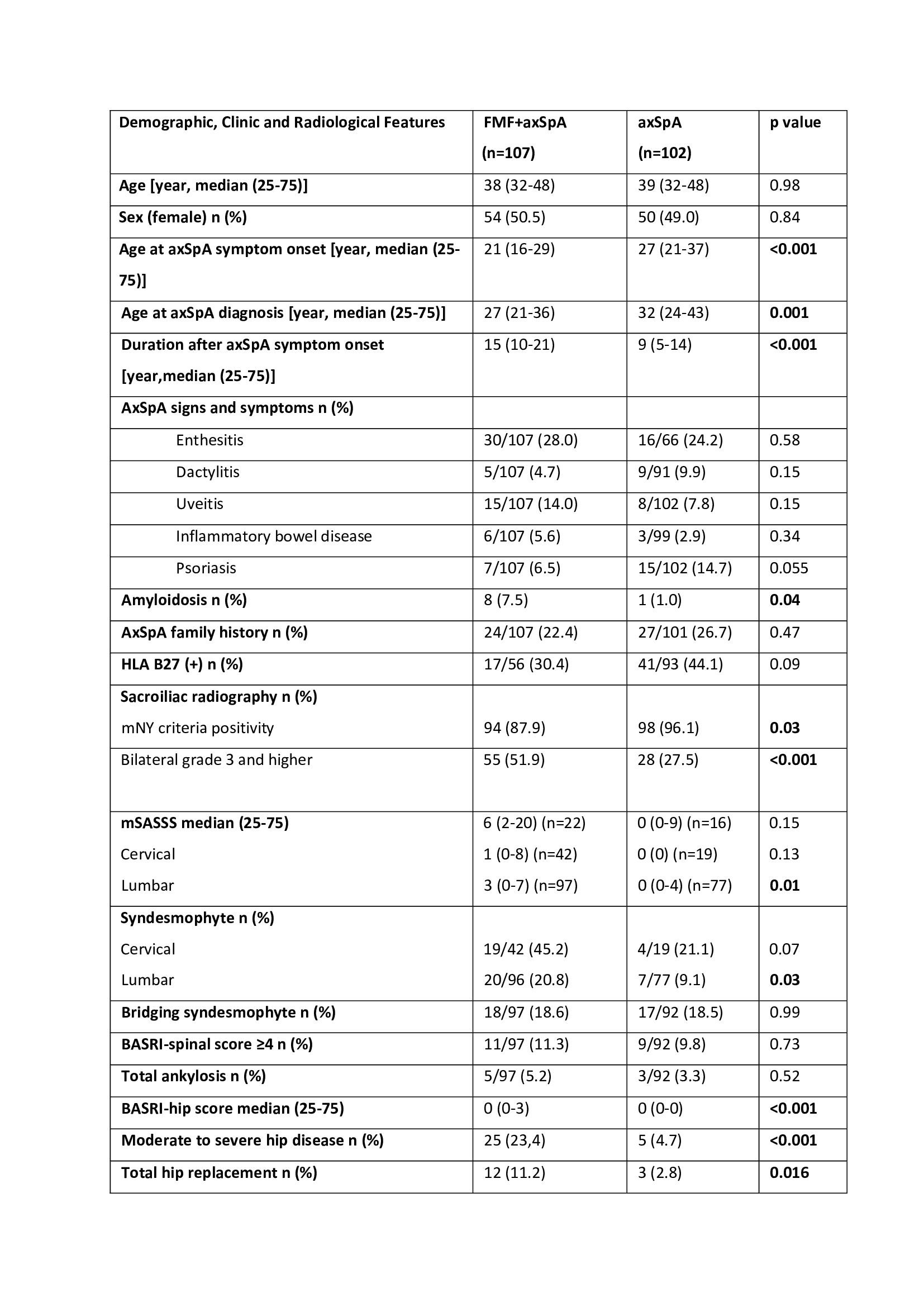Session Information
Session Type: Poster Session A
Session Time: 8:30AM-10:30AM
Background/Purpose: The co-existence rate of Familial Mediterranean Fever (FMF) and axial spondyloarthritis (axSpA) in adults is ranging from 0.5% to 7.5%. Clinical implications of this association in the course of FMF is still a research question. Compared to axSpA, FMF+axSpA tends to have more peripheral joint involvement and start at an earlier age, but may have similar prevalence of psoriasis and inflammatory bowel disease. The aim of this study was to compare of demographic, clinic and radiological features of patients with axSpA and FMF+axSpA.
Methods: A total of 9630 FMF patients was detected according to the ICD-10 code (E85.0) of FMF in Hacettepe University Hospital database. 241 of these patients also had axSpA according to the ICD-10 code (M45). FMF diagnosis was confirmed by Tel- Hashomer criteria. AxSpA diagnosis was confirmed by either presence of sacroiliitis on sacroiliac radiography according to the Modified New York (mNY) Criteria or presence of active sacroiliitis according to ASAS criteria on magnetic resonance imaging. 136 patients were confirmed according to these criterias as having FMF+axSpA. 107 of these patients were previously treated with any biological drugs. As a control group, 102 consequent axSpA patients without FMF previously treated with any biological drugs recorded on the TReasure database, age and sex matched with other group and followed up at our center were included in the analysis. Demographic, clinic and radiological features of those patients in both groups were compared. p < 0.05 was considered as statistically significant, correction for multiple comparisons was not performed.
Results: 107 patients (54 (50.5%) female) were included in FMF+axSpA group and 102 patients (50 (49.0%) female) were included in axSpA group. Age at axSpA symptom onset and diagnosis were earlier, disease durations were longer in FMF+axSpA group in our study cohort (Table 1). Frequency of axSpA signs and symptoms were comparable. Amyloidosis was more prevalent in FMF+axSpA group (7.5% vs. 1%, p=0.04). 94 (87.9%) patients in FMF+axSpA group and 98 (96.1%) patients in axSpA group had radiographic sacroiliitis according to mNY criteria (p=0.03). Lumbar mSASSS score was higher and lumbar syndesmophyte frequency were higher in FMF+axSpA group. Severe spinal involvement (BASRI≥4 and total ankylosis) is similar in both groups. Radiologically documented moderate to severe hip disease and total hip replacement were more prevalent in FMF+axSpA group (respectively; 23.4% vs. 4.7%, p< 0.001; 11.2% vs. 2.8%, p=0.016).
Conclusion: Co-existence of FMF and axSpA significantly brought the age of axSpA onset earlier. Radiographic characteristics in FMF+axSpA were found to point a more advanced disease, however a possible bias related to high disease duration of FMF+axSpA. As expected, rate of amyloidosis and hip involvement were higher in FMF+axSpA group.
To cite this abstract in AMA style:
Kiracı M, Bilgin E, Duran E, Farisogulları B, bolek E, Yardımcı G, Ozsoy Z, Ayan G, Uzun G, Akbaba T, Balci Peynircioglu B, Karadag O, Akdogan A, Apraş Bilgen S, Kiraz S, Ertenli A, Kalyoncu U, Kilic L. Comparison of Demographic, Clinic and Radiological Features of Axial Spondyloarthritis Patients with and Without Accompanying Familial Mediterranean Fever [abstract]. Arthritis Rheumatol. 2021; 73 (suppl 9). https://acrabstracts.org/abstract/comparison-of-demographic-clinic-and-radiological-features-of-axial-spondyloarthritis-patients-with-and-without-accompanying-familial-mediterranean-fever/. Accessed .« Back to ACR Convergence 2021
ACR Meeting Abstracts - https://acrabstracts.org/abstract/comparison-of-demographic-clinic-and-radiological-features-of-axial-spondyloarthritis-patients-with-and-without-accompanying-familial-mediterranean-fever/

